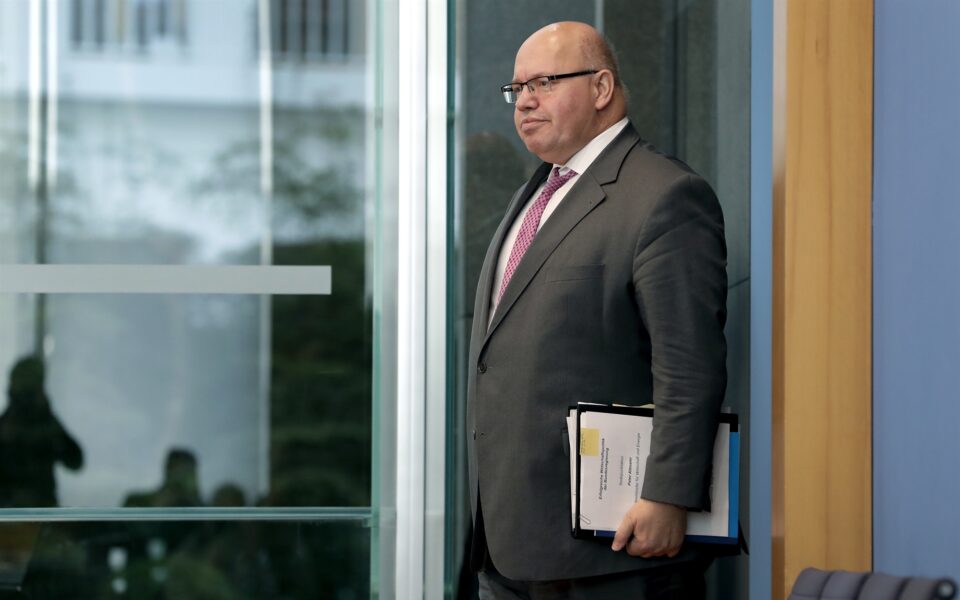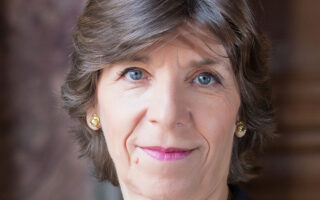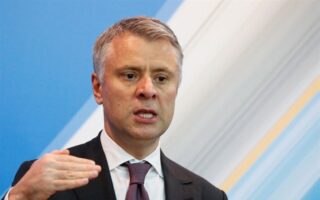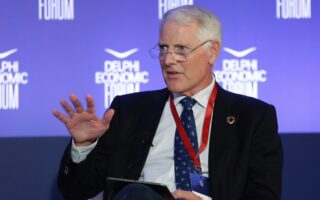Greece missed chance to turn to green power
Former German energy minister describes Berlin’s thwarted plan for a large-scale investment in solar panels in the country

Greece missed an opportunity to decouple its electricity generation from lignite mining using German investments in photovoltaics due to domestic resistance, Germany’s former energy minister and chief of staff in Angela Merkel’s Chancellery, Peter Altmaier, has told Kathimerini, referring to a mammoth photovoltaics project named Helios promoted in 2012 that was to see the installation of a solar panel system in Greece and the power produced transmitted to Germany.
The Christian Democrat distances himself from the hawkish views of former finance minister Wolfgang Schaeuble in 2015, declaring himself fully on Merkel’s side against Grexit. He even emphasizes that he is “ashamed of some inappropriate quotes” that were heard against Greece during the country’s debt crisis. When it comes to Greek-Turkish relations, Altmaier says that “the territorial integrity of a NATO member may never be challenged by another NATO member.”
As for Germany’s dependence on Russian gas, he believes it could not have been avoided, as Gazprom’s cheap energy served as a backup plan in Germany’s green transition. The German politician spoke recently about Greece and Cyprus at the Athens Security Forum, as a guest of the Konrad Adenauer Stiftung delegation.
What are your thoughts on the war in Ukraine? Do you think we have entered a long period of instability in Europe?
First of all, this war is a big failure for the Russian ideology, military and economic system. We have seen that the Russian military is far from being sufficient. At the same time, nobody knows how long this war will last. It is having disastrous consequences for people in the area but also for Europe. The fact that we no longer buy Russian gas or oil means that there is – and will be for a couple of years – a shortage of gas in the global market, which makes the competition stronger and gas much more expensive. The European economy is entering a very serious stage where recession is possible, at least in many countries in the EU.
How should Germany position itself in this new setting of European security?
What we need in Europe is more unity, solidarity and leadership. In the past we have seen that it is easier to overcome a crisis when we have French-German consensus and compromise beforehand, taking account of the needs and interests of our neighbors and friends in the EU. Contrary to the past 30 years, this hasn’t happened so far. I’m worried there is a lack of leadership and I hope that this will change soon. This is also something that the rest of Europe expects.
Speaking of security, in the Eastern Mediterranean, Turkey is issuing threats against Greece. How do you assess the situation?
I’m as old as I look [smiles] and all my lifetime the Turkish-Greek relationship has never been as good as necessary and as many people in both countries would like it to be. This has made life more difficult and has created enormous collateral damage. The territorial integrity of a NATO member may never be challenged by another NATO member, all conflicts within NATO must be resolved peacefully without military action. That is what we have achieved and secured for decades and I see no single reason to change it.
‘It is easier to overcome a crisis when we have French-German consensus and compromise beforehand, taking account of the needs and interests of our neighbors and friends in the EU’
German governments have sometimes been criticized for being too soft on Turkey and Erdogan. What is your opinion?
I don’t believe so. Turkey is a member of NATO as Greece is. As long as Turkey is a member of NATO, it has a geostrategically important role, as Greece has a geostrategic role that is very important. We have always tried to de-escalate tensions between the two sides. In this context, we had also played a role in the handling of the refugee crisis in 2015 in order to bring relief to both Greece and Turkey, both struggling with millions of refugees. Germany has accommodated about 2 million refugees from Syria, Iraq and Afghanistan.
You were minister of energy during the years when Germany was promoting the Nord Stream 2 pipeline. Today, looking back, what are your thoughts on the Merkel government’s strategy, as we saw it in the energy relationship with Russia?
Both Germany and Greece were importing large quantities of Russian gas for many years. Germany was a leading country in Europe with regard to energy transition and climate protection. Nord Stream 2 was a result of the cross-political-party decision to switch off all our nuclear power plants, and the coal-powered plants because otherwise we would not have been able to reduce the CO2 emissions. Therefore, more gas was needed as backup for the volatility of renewable energies. At the same time Germany and other countries (like the Netherlands) reduced its own gas production (Germany by 50%) as a consequence of the fact that it was unpopular amongst the local population impacted by that. But we were also looking for a diversification by Russian gas during the time I was minister. I made an offer to the Americans that we would build two LNG terminals – it was in January 2019. I told them we have to be more independent. But at the end of the day they were not constructed because no German gas company or consumer was ready to buy American gas at significantly higher prices. And this was the same situation in other countries. But the war in Ukraine has changed everything. By the way, Greece can become an important energy hub and producer for Europe. I remember when we had talks with the Greek authorities in the years 2010-12, as we wanted to invest on a large scale in solar panels in Greece. But at that time it never led to significant results.
Why?
Our idea was that landowners and small farmers would keep these solar panels and this was contested from other sides in Greece. I never understood exactly why, but it was never realized, although it was a big opportunity for both countries. The idea then was not to export electricity to Germany but to invest with European money in order to decarbonize electricity production in Greece. I can imagine that there was some resistance from certain sectors, as was the case in other countries as well.
Germany played an important role during the Greek debt crisis. How did you experience that period? Did you agree then with Wolfgang Schaeuble’s view that it might be better for Greece to leave the eurozone?
No. It was always clear that it was in the EU’s best interest that Greece stay in the eurozone – and Chancellor Merkel acted accordingly at the European Council. As her chief of staff at the Chancellery I wholeheartedly supported her. Of course, the Tsipras government had to accept and implement measures in order to stabilize the economy in Greece as well. This strategy proved to be right. Today Greece can be very proud of what it has achieved through its efforts with the support of the EU. And you give me one more opportunity to say that I am ashamed of some inappropriate quotes that were sometimes heard with regard to Greece during the Euro crisis.
What are the signs from the German economy today? Some worry about the risk of Germany turning from a locomotive of the eurozone into a patient.
Germany has been economically a stronghold in Europe for many years. This has also helped European countries to grow in the context of mutual exchange relationships. That’s why a recession in Germany would likely affect other countries of Europe as well.





